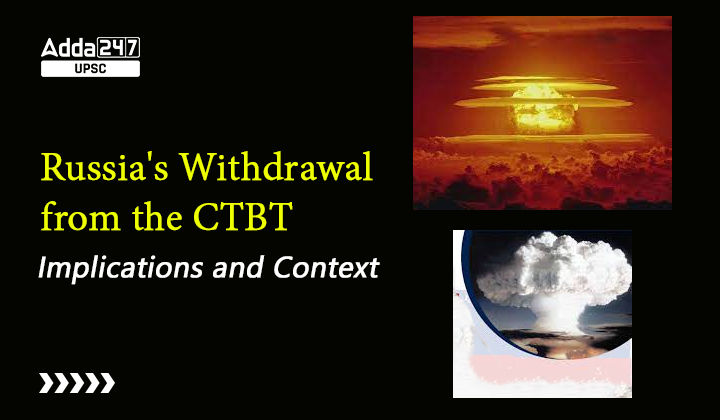Table of Contents
Russia’s recent decision to withdraw from the Comprehensive Nuclear Test Ban Treaty (CTBT) has raised concerns and questions about the future of nuclear disarmament and global security. In this article, we will delve into the reasons behind Russia’s withdrawal, the significance of the CTBT, its historical background, and the implications of this move.
CTBT: A Brief Overview
- The Comprehensive Nuclear Test Ban Treaty (CTBT) is an international agreement aimed at prohibiting all nuclear explosions, for both civilian and military purposes.
- It was adopted by the United Nations General Assembly in 1996, and since then, it has been signed by 185 countries and ratified by 185, though it has not entered into force due to the non-ratification of key countries.
Why Russia Is Withdrawing
- Russia’s decision to withdraw from the CTBT is driven by a complex set of factors. One primary reason is the deteriorating relationship between Russia and the United States, which has escalated due to Russia’s ongoing war in Ukraine.
- Deputy Foreign Minister Sergei Ryabkov has made it clear that Russia is not willing to engage in nuclear discussions with the U.S. until it changes its “hostile” stance.
Historical Context: The Arms Race and CTBT
- To understand the significance of the CTBT, we must revisit the history of nuclear testing. The United States and the Soviet Union conducted thousands of nuclear tests during the Cold War, resulting in significant global concern over health and environmental consequences.
- These concerns led to various treaties, such as the Limited Nuclear Test-Ban Treaty (LTBT) and the Threshold Test Ban Treaty (TTBT).
- However, the breakthrough came with the end of the Cold War and the subsequent adoption of the CTBT in 1996, which aimed to comprehensively ban explosive nuclear testing.
Key Countries’ Stance on the CTBT
- While the CTBT enjoys widespread support, there are notable exceptions among key countries. The United States signed the treaty in 1996 but never ratified it. India, another nuclear-armed nation, has not signed the CTBT and maintains reservations about its implications on its national security.
Implications of Russia’s Withdrawal
- Undermining Global Non-Proliferation Efforts: Russia’s withdrawal from the CTBT could be seen as undermining global efforts to prevent the proliferation of nuclear weapons.
- The treaty serves as a cornerstone in the nuclear disarmament architecture.
Tensions in International Relations
This move by Russia further heightens tensions in international relations, particularly with the U.S. It adds to the list of contentious issues between the two nations and makes cooperative efforts in the field of nuclear disarmament more challenging.
Erosion of Nuclear Taboos: The CTBT has played a crucial role in making nuclear testing a taboo, with very few exceptions like North Korea. Russia’s withdrawal threatens to weaken this norm, potentially encouraging other nations to reconsider their commitment to the treaty.
Did the CTBT Stop Nuclear Testing?
While the CTBT has been successful in curbing nuclear testing, it is essential to acknowledge that no treaty can guarantee absolute compliance. The treaty, however, has played a significant role in reducing the number of nuclear tests globally, making it a pivotal instrument in nuclear disarmament.
Conclusion
Russia’s decision to withdraw from the CTBT is a cause for concern in the realm of global security. It highlights the need for diplomatic efforts to address the underlying issues that have strained international relations and undermined nuclear disarmament initiatives. The CTBT, despite its imperfections, remains a vital step towards a world free of nuclear weapons, and preserving and strengthening it should be a priority for all nations committed to global peace and security.



 TSPSC Group 1 Question Paper 2024, Downl...
TSPSC Group 1 Question Paper 2024, Downl...
 TSPSC Group 1 Answer key 2024 Out, Downl...
TSPSC Group 1 Answer key 2024 Out, Downl...
 UPSC Prelims 2024 Question Paper, Downlo...
UPSC Prelims 2024 Question Paper, Downlo...





